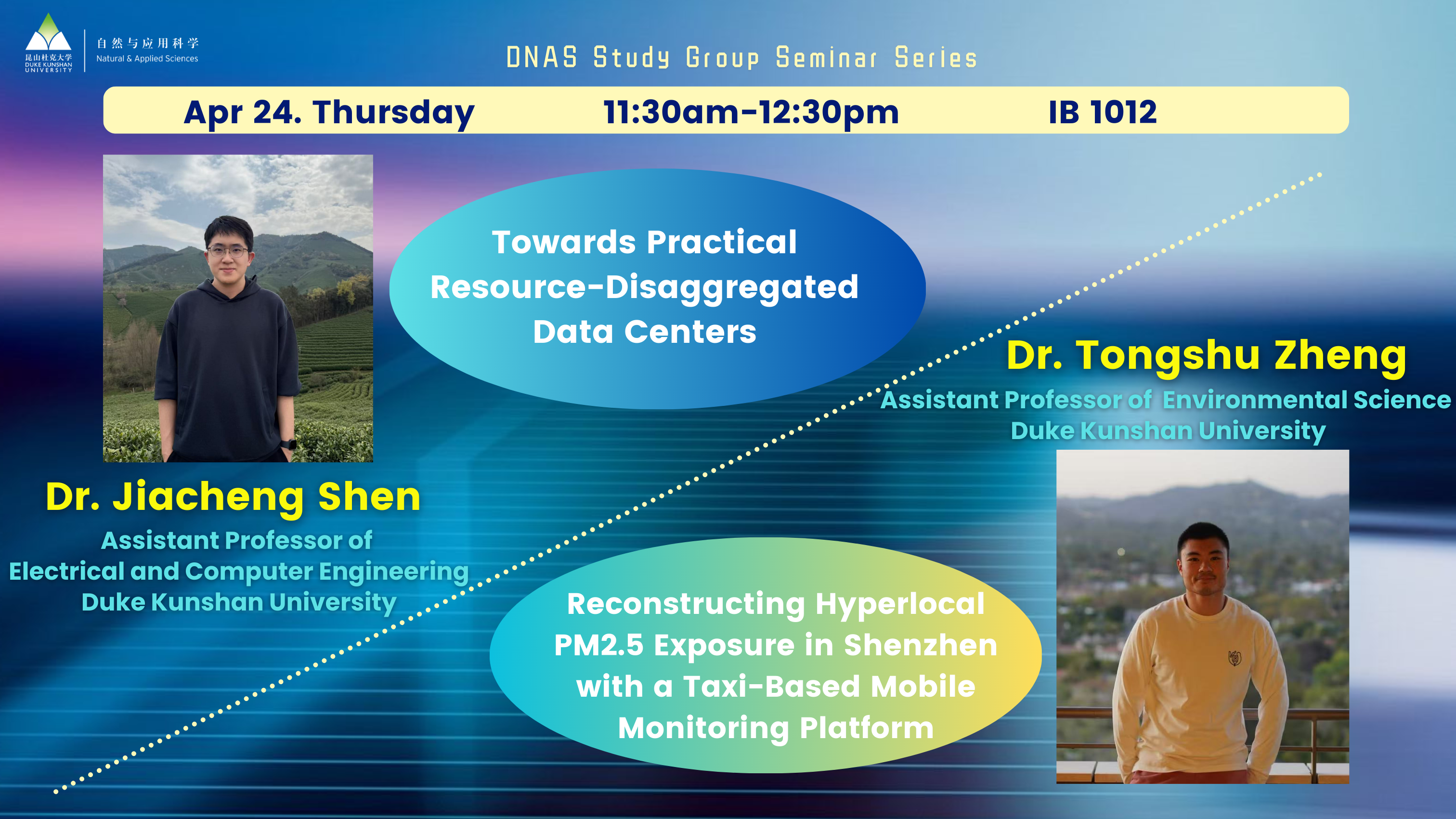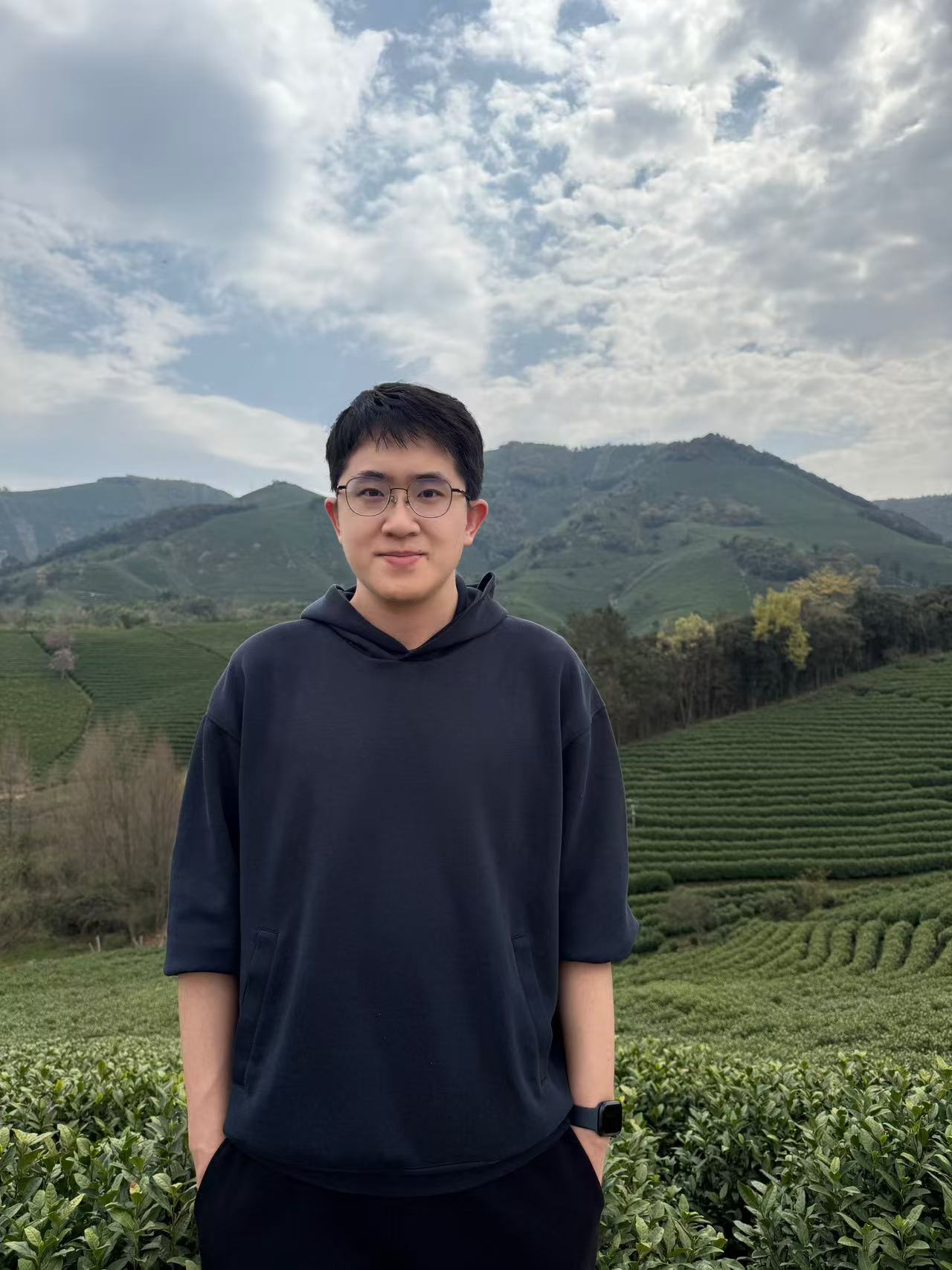Date and Time (China standard time): Thursday, April 24, 11:30 am – 12:30 pm
Location: IB 1012

Title: Towards Practical Resource-Disaggregated Data Centers
Speaker:
Dr. Jiacheng Shen

Assistant Professor of Electrical and Computer Engineering
Duke Kunshan University
Abstract:
Achieving high resource efficiency is essential for modern cloud data centers, yet current data centers still suffer from low resource utilization due to their coarse-grained resource management. Resource disaggregation is a promising architecture that can improve resource efficiency by enabling fine-grained resource management. However, its widespread adoption has been hindered by its performance issues. In this talk, I will introduce our efforts to design high-performance and practical systems for resource-disaggregated data centers. I will outline our design guidelines for constructing efficient applications within this architecture and present a case study that enhances indexing system performance using these guidelines. Additionally, I will share our experiences applying resource disaggregation in real-world data centers. Finally, I will conclude the talk with an overview of my ongoing and future work on integrating resource disaggregation with traditional data center workloads and emerging large language model (LLM) workloads.
Bio:
Jiacheng Shen is an Assistant Professor of Electrical and Computer Engineering at DKU. His research focuses on constructing efficient systems for modern cloud data centers. Prior to DKU, he obtained his PhD degree from the Chinese University of Hong Kong in 2024 and BSc degree from Fudan University in 2020. Dr. Shen has published 11 peer-reviewed papers on top Systems and Software engineering conferences, e.g., OSDI, SOSP, FAST, TOS, etc. He also actively serves the academic community as program committee members for top system conferences including USENIX ATC and IEEE ICDCS.
Title: Reconstructing Hyperlocal PM2.5 Exposure in Shenzhen with a Taxi-Based Mobile Monitoring Platform
Speaker:
Dr. Tongshu Zheng

Assistant Professor of Environmental Science
Duke Kunshan University
Abstract:
Integrating mobile air quality monitoring using fast-response instruments with land-use machine learning holds promise for hyperlocal mapping of air pollution at high spatial and temporal resolutions (e.g., 30 m and 1-hour resolution). However, most related studies have been limited either to small areas, relied on high-cost reference-grade instruments, or required deploying a large fleet of vehicles (e.g., over 100), creating significant uncertainty about the method’s effectiveness in larger areas with minimal cost and labor. To bridge this gap, we equipped four taxi with pre-calibrated, low-cost Plantower PM2.5 sensors, collecting over 24.6 million 1 Hz high-frequency measurements (~3708 hours) from March 10th, 2024, to September 12th, 2024, across the roadways in the Chinese megacity of Shenzhen. These actual measurements represent only about 2% of all possible combinations of 30 m road segments and 1-hour timestamps across the entire road network covering over 550 km². We utilized a land-use-based kriging-RF machine learning model to reconstruct the remaining 98% of these combinations. Our model demonstrated strong out-of-sample performance for both mobile measurements (R² ~ 0.83, bias ~ 0 µg/m³, MAE ~ 3.2 µg/m³) and fixed-site measurements (R ~ 0.70, bias ~ 1.72 µg/m³, MAE ~ 4.1 µg/m³). We further estimated Shenzhen population PM2.5 exposure at a 100 x 100 m grid based on reconstructed road network PM2.5 concentrations and investigated disparities in PM2.5 exposure within urban villages in Shenzhen. This study provides a promising, low-cost approach for hyperlocal air pollution concentration and exposure mapping and management in cities worldwide.
Bio:
Tongshu Zheng is an Assistant Professor of Environmental Science at Duke Kunshan University (DKU). He earned his BSc in Environment and Sustainable Development from The Hong Kong Polytechnic University (PolyU) in 2016, followed by an MS and PhD in Civil and Environmental Engineering from Duke University in 2018 and 2021, respectively. Before joining DKU, Tongshu began his career at the California Air Resources Board (CARB), a California state agency dedicated to reducing air pollution. At CARB, he led high-profile data engineering projects, including the development of a Snowflake-based cloud data management system for the state’s greenhouse gas (GHG) monitoring network. He was also deeply involved in community outreach, partnering with Latino communities in Southern California to implement and support air quality monitoring initiatives. He later joined Aclima, a startup specializing in mobile air quality monitoring across the US. At Aclima, Tongshu managed, analyzed, and developed predictive models using massive datasets collected from large-scale sensors-equipped vehicle fleets. These fleets conducted year-long monitoring campaigns, with each vehicle measuring up to 10 different pollutant species at a second-level and 30 m resolution. His work supported large-scale contracts with state and local government clients, including California, New York, Illinois, and Washington, D.C. Tongshu’s current research lies at the intersection of air pollution, data science, and computer science. He is particularly interested in integrating data science techniques with emerging and low-cost air quality measurement technologies—including mobile sampling, low-cost sensors, and satellite data—to: (1) map urban air pollutants at hyperlocal spatial resolutions; (2) investigate how human activities and air filtration systems influence PM2.5 levels across different indoor environments; and (3) develop satellite e-driven approaches for detecting methane leaks in urban areas.
